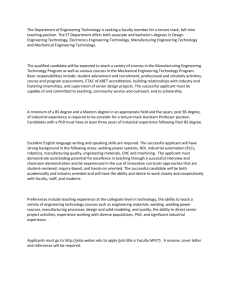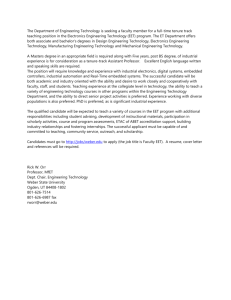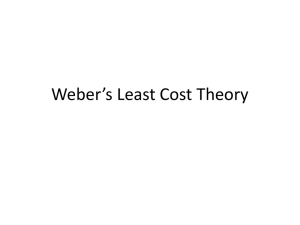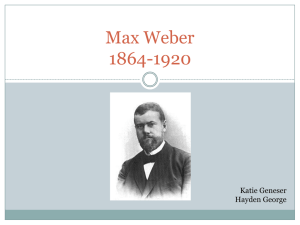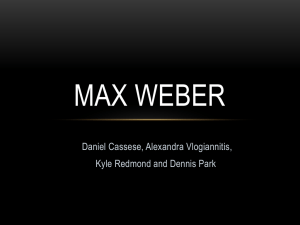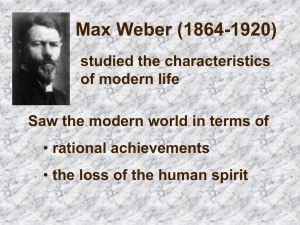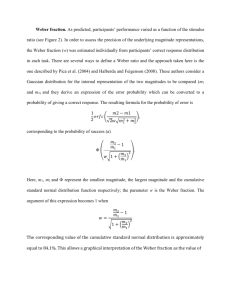SOCY4400 Contemporary Social Theory
advertisement
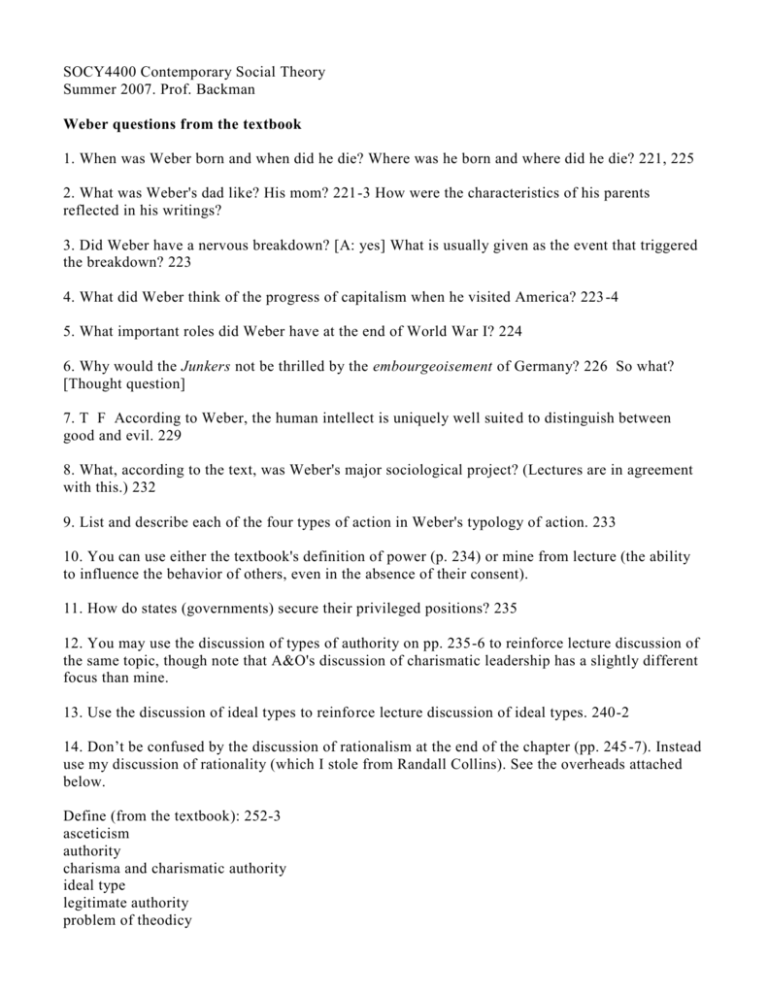
SOCY4400 Contemporary Social Theory Summer 2007. Prof. Backman Weber questions from the textbook 1. When was Weber born and when did he die? Where was he born and where did he die? 221, 225 2. What was Weber's dad like? His mom? 221-3 How were the characteristics of his parents reflected in his writings? 3. Did Weber have a nervous breakdown? [A: yes] What is usually given as the event that triggered the breakdown? 223 4. What did Weber think of the progress of capitalism when he visited America? 223 -4 5. What important roles did Weber have at the end of World War I? 224 6. Why would the Junkers not be thrilled by the embourgeoisement of Germany? 226 So what? [Thought question] 7. T F According to Weber, the human intellect is uniquely well suited to distinguish between good and evil. 229 8. What, according to the text, was Weber's major sociological project? (Lectures are in agreement with this.) 232 9. List and describe each of the four types of action in Weber's typology of action. 233 10. You can use either the textbook's definition of power (p. 234) or mine from lecture (the ability to influence the behavior of others, even in the absence of their consent). 11. How do states (governments) secure their privileged positions? 235 12. You may use the discussion of types of authority on pp. 235-6 to reinforce lecture discussion of the same topic, though note that A&O's discussion of charismatic leadership has a slightly different focus than mine. 13. Use the discussion of ideal types to reinforce lecture discussion of ideal types. 240-2 14. Don’t be confused by the discussion of rationalism at the end of the chapter (pp. 245 -7). Instead use my discussion of rationality (which I stole from Randall Collins). See the overheads attached below. Define (from the textbook): 252-3 asceticism authority charisma and charismatic authority ideal type legitimate authority problem of theodicy rational-legal authority routinization of charisma traditional authority value freedom Weimar Republic Weber questions from lecture 1. What are the central characteristics of a bureaucracy, according to Weber? What were Weber’s feelings about the productivity of bureaucratic organizations? 2. What is the place of emotions in Weber’s work? (Be sure to mention the “iro n cage.”) 3. Present Weber’s analysis of the stratification system. Be sure to mention the three spheres of stratification and the one that he felt ultimately was most decisive in structuring society. 4. Describe Weber’s three types of domination. 5. Describe two of the methodological tools Weber emphasized. 6. Present Weber’s theory in The Protestant Ethic and the Spirit of Capitalism. How does this theory “turn Marx on his head?” 7. Why might Nietzsche sometimes be considered anti-rational? Why is the charge of antirationality somewhat misleading in Nietzsche’s case? 8. What did Weber’s wife do? 9. Define (in Weber’s terms): Verstehen, ideal type, class, status group, power [important], the problem of succession 10. What did Weber feel was primarily responsible for the transition of Western Europe from its situation after the fall of Rome to the situation during his lifetime? 11. What three aspects of Weber’s analysis of rationality did we discuss in lecture. [Note that the text identifies a somewhat different three; use mine, not theirs.] [See the attached information below.] 12. “Value neutrality” is a term often associated with Weber. What does it have to do with Weber? Overheads I often use in SOCY1000 when discussing Weber Max Weber and Rationality _____________________________________________________________ Max Weber (Mocks VAY-bur) argued that increasing rationality in social life was key to the development of Europe in the centuries after the fall of Rome _____________________________________________________________ Weber’s three forms of rationality: 1. Knowledge of how to achieve desired ends 2. Predictability and regularity in complex systems, especially the market and government 3. Active efforts to master or change the world Put another way, Weber argued Europe owed its social and economic structure to 1) cause and effect knowledge, 2) predictable markets and governments, and 3) norms encouraging actors, individual and corporate, to take advantage of knowledge and predictabili ty The results were dramatic: Better life chances Fabulous economic productivity Unprecedented military might Weber argued there are aspects of human behavior that are emotional, not rational Seen in bureaucracies, leadership Bureaucracies: are better ways of organizing large scale efforts than any previous way of organizing minimize individuality among bureaucrats minimize emotional behavior can be “iron cages” in which we accomplish a great deal, but at great emotional cost Forms of Authority/Leadership/ Followership 1. Traditional leadership: we follow the leader because we always have (e.g., in a hereditary monarchy) 2. Rational-legal leadership: we follow the leader because the rules or the laws tell us to (this is the basis for bureaucracies) 3. Charismatic leadership: we follow the leader because we like the leader and want to please him or her (such authority is non-rational) Weber’s Definition of Class _____________________________________________________________ A number of people sharing some of the same bases for their “life chances,” where those bases depend on the possession of goods and opportunities and on the conditions of the market, including conditions for access to the market _____________________________________________________________ The most enduring class distinctions are between people whose income is based on their property (the propertied) and people whose income is based entirely on their labor (the non -propertied)
